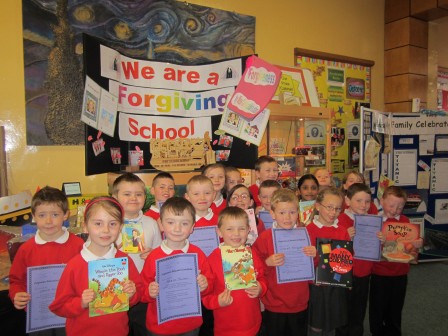Our Forgiveness Blog
The Mathematics of Forgiveness
When we are treated deeply unjustly by others, we have a tendency to be wounded in at least eight ways. First is the injustice itself. Second is the emotional reaction, such as considerable anger or frustration or sadness. Third, we sometimes feel shame because others are looking and wondering. Fourth, all of the above can make us tired. Fifth, we sometimes can’t stop thinking about what happened. Sixth, as we compare ourselves to the one who hurt us, we see ourselves as coming up short. Seventh, we sometimes have to make unwanted changes in our lives. And eighth, we drift into pessimism.
One injustice, eight wounds. Now, suppose one person hurt you deeply 20 times. That is 20 X 8 = 160 wounds you are carrying around inside of you.
Suppose further that 5 other people have hurt you 10 times each……just wait a minute., please….doing the math here……That is 400 more wounds. Adding the first person who hurt you to the other five who hurt you and look. You are carrying around at least 560 wounds inside of you.
Injustice has a way of making us round-shouldered if you think about it. But be of good cheer. Forgiveness properly practiced can eliminate most of these wounds, allowing you to stand up straight perhaps for the first time in years.
Do the math…..then please consider forgiving.
Robert
Perseverance and Forgiveness
2002…. That is the year the International Forgiveness Institute began writing forgiveness education curriculum guides for teachers. We started with first grade classrooms in Belfast,  Northern Ireland. When we started knocking on principals’ doors to discuss this life-giving project, we were met with skepticism.
Northern Ireland. When we started knocking on principals’ doors to discuss this life-giving project, we were met with skepticism.
“You will not last more than three years,” was what we heard consistently. Three years? Why three in particular?
“Because when people come from foreign lands to help Belfast, those well-meaning people never stay more than three years,” was the retort.
It became apparent that people go to Belfast with high expectations, great enthusiasm, and lots of adrenaline as they embark on their new adventure. Then the reality strikes. By year three the fatigue sets in, the streets of Belfast are all too familiar. It is now work and not adventure. Goodbye, Belfast!
The IFI has had a presence in Belfast for 14 years now. So far, we have beaten the odds by staying almost 5 times longer than expected.
This issue of perseverance and endurance has me thinking. How can one preserve the idea of forgiveness in families, schools, places of worship, and places of employment? That seems easy……for about three years, but what about the next 10 or 20 or even 40 years?
How can forgiveness endure when there are so many diversions in life, so many new and good and novel ways to introduce new curricula to schools or new programs to businesses?
It takes a team and at least one person with an iron-clad will in the short-run. Forgiveness can too easily fade from the scene without this.
How will you preserve forgiveness in your own heart and in your most
important relationships? How will you keep it from drifting out to sea, almost unnoticed as it fades? The first step is to realize that this can happen….and then not let it happen.
Robert
Future Forgiveness Again
Do you realize that your practicing forgiveness now may pay unexpected dividends for you decades from now? As an example, look at how the Amish community handled the tragedy in Pennsylvania in 2006. The world wondered how the community could stand in forgiveness after 10 girls were shot and 5 died. The answer: Forgiveness is part of their daily culture.
Please realize that each decision and each act of forgiveness now may pay great dividends for you and others 20 years from now. Forgiveness today is an investment in your future.
Robert
Future Forgiveness for You
To grow in any virtue is similar to building muscle in the gym through persistent hard work. We surely do not want to overdo anything, including the pursuit of fitness.
Yet, we must avoid under-doing it, too, if we are to continue to grow. It is the same with forgiveness. We need to be persistently developing our forgiveness muscles as we become forgivingly fit. This opportunity is now laid out before you. What will you choose? Will you choose a life of diversion, comfort, and pleasure, or the more exciting life of risking love, challenging yourself to forgive, and helping others in their forgiveness fitness?
Enright, Robert D. (2012-07-05). The Forgiving Life: A Pathway to Overcoming Resentment and Creating a Legacy of Love (APA Lifetools) (Kindle Locations 5359-5360). American Psychological Association. Kindle Edition.
When Evil Seems to Be Having Its Way
Lance Morrow: “Evil possesses an instinct for theater, which is why, in an era of gaudy and gifted media, evil may vastly magnify its damage by the power of horrific images.” If this is true, we need forgiveness all the more in our times.
Forgiveness is not justice and therefore focuses on effects, not direct solutions to injustice. When injustice reigns, it surely is the duty of communities to exercise justice to counter that which is unjust.
Yet, what then of the effects of the injustice? Will the quest for and the establishment of justice in societies suffice to cure the broken heart? We think not and this is where forgiveness is needed for those who choose it.
Is there a better way of destroying the damaging effects of evil than forgiveness? As a mode of peace, forgiveness is a paradox because at the same time it is a weapon, one that fights against the ravages of evil. By destroying resentment, forgiveness is a protection for individuals, families, groups, and societies.
Robert



